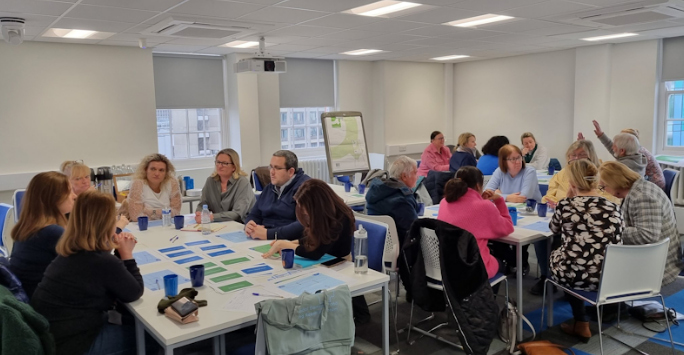Dementia research: putting PPIE at the heart

Dr Laura Prato, Dr Megan Readman and Dr Megan Polden are DEM-COMM Research Fellows funded by the NIHR ARC NWC and the Alzheimer’s Society. Here they explain how they ensure patient and public involvement and engagement (PPIE) is at the forefront of their research.
Effective PPIE ensures that research provides the answers needed to everyday problems experienced in daily life. Carers, relatives and people living with dementia (PWD), understand the challenges of living with the condition better than anyone else, and it is vital that research is driven by their positive and negative experiences.
Dr Laura Prato
My fellowship project focuses on the dementia care navigation service available in Liverpool. Meeting with carers and listening to their experiences and insights into the navigation service has been invaluable in deciding the questions we need to be asking and the direction the research needs to take. Carers were able to identify complexities within service provision that we as researchers were not aware of, and outline the ways in which these complexities had impacted on their, and their loved ones, experiences.
After a collaborative meeting with carers and the service manager it was agreed that some changes, based on carer experiences, needed to be implemented immediately without waiting for the research project to be complete. This reflects the power of PPIE. When the right individuals are involved and service providers and people with lived experience talk, and listen to one another, immediate and effective changes can be made to improve experiences and services at the source.
I look forward to working with my PPIE advisers during the next stage of the project, where they will help me with the analysis process to make sure that I am focusing on what matters most, and not missing vital findings that can make a difference.
Dr Megan Readman
My fellowship project aims to further our understanding of hearing loss in the context of Lewy Body Dementias (Parkinson’s Disease Dementia and Dementia with Lewy Bodies). Specifically, I aim to investigate whether hearing loss increases the likelihood of an individual going on to develop Lewy body dementias and explore the experience of hearing loss for people living with Lewy body dementias and how hearing loss may influence certain symptoms people experience.
Hearing the experiences of both people living with Lewy body dementias and concurrent hearing loss, and people who care for someone who lives with a Lewy body dementia and hearing loss was central to the conceptualisation of this project. These collaborative conversations not only highlighted the need for this research, but also steered both the outcome measures we have embedded in quantitative analyses and the interview questions developed. Indeed, the reflections of one individual living with Lewy Body Dementia led to me embedding an additional assessment, reflecting specific symptomology, into my experimental study that the research team had previously considered. Thus, demonstrating the impact of effective PPIE.
I have thoroughly enjoyed working with my PPIE advisers thus far. Moreover, I am particularly looking forward to working with them during data analysis and interpretation. Drawing on the perspective of people who understand our data from a lived perspective will ensure all conclusions are relevant and that future research we develop truly addresses the need of the people for whom we hope our research benefits.
Dr Megan Polden
My fellowship examines the impact of singing and dancing support services for PWD and their carers and is in collaboration with two local charities, ‘The Brain Charity’ and ‘Lyrics and Lunch’.
Hearing the experiences of people who attend these services was invaluable for this project. Their insights helped shape the research project and were vital in ensuring the right questions were being asked and focusing on outcome measures that were most important to PWD and carers. PWD aided in advising on study design and the number of outcome measures to ensure participation in the study was not burdensome or overtly taxing.
Going forward, PPIE advisers will help with the analysis process to ensure that we fully capturing their experiences and that important findings are not missed. Further, PPIE advisors will be involved with the dissemination and implementation of the project findings. PPIE from early stages of this research project will help with effective implementation of research findings and promote greater impact.